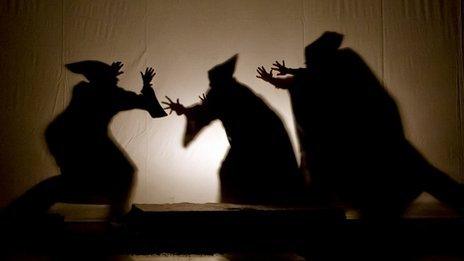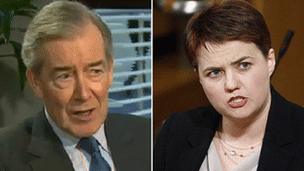Scottish independence: Hubble, bubble, toil and trouble
- Published

Alex Salmond's list, admittedly, was rather long. It stretched out, indeed, to the crack of doom rather like the parade of regal apparitions presented to Macbeth by the weird sisters.
In the case of King M., it is thought that Shakespeare was sooking up to the Stuarts by reflecting the longevity of their dynasty.
Mr Salmond had a rather different purpose. He was spelling out the powers which would, he argued, accrue to an independent Scotland - despite the relative loss of power involved in continuing to share sterling.
The first minister's endeavour was understandable. After all, he is being pursued by accusations that his independence offer is less than it seems, given the suggestion by the governor of the Bank of England that a sterling zone would involve a derogation of sovereignty.
Mr Salmond first listed such matters as: excise duties, VAT, oil and gas revenues, National Insurance, income tax, corporation tax, competition law, employment legislation, the minimum wage……and so on.
'Wee things'
Challenged afresh, he tried again. An independent Scotland would also be able to reverse the abolition of the spare room subsidy (that is, scrap the bedroom tax), to recoup the revenue from enhanced childcare.
And there was more. ("Another yet! A seventh! I'll see no more!") With independence, Scotland would be able to ditch "weapons of mass destruction" - and to steer clear of "illegal wars". One presumes he had in mind a particular conflict which was occasioned by the search for WMD.
Johann Lamont rose again. It was all very well for the first minister to list the "wee things" we could do with independence….. The rest of her remarks were drowned by a cacophony which rivalled the rumpus provoked by the arrival of the uninvited Banquo at the feast.
The SNP benches, front and back, yelled and roared. Mr Salmond egged them on, oratorically. The gist of his argument was that nuclear warfare and global conflict were, on balance, all things considered, quite substantial things, as were the other items on his list.

Ruth Davidson moved to distance herself from comments made by Tory peer Lord Lang
In the chamber, Ms Lamont persisted, apparently undeterred. The first minister, she averred, had fought a war on the currency - and lost.
But offstage matters were less certain. The Labour leader had mis-spoken. It was a "slip of the tongue". But it was as nothing, Labour insisted, to the "big thing" which faced the people of Scotland, the choice in the referendum.
Cue the online circulation of Mr Salmond's list, attached to the phrase "wee things." (Labour, incidentally, objected that this was partly occasioned by a Scottish government special adviser.)
Questioned by Ruth Davidson for the Conservatives, Alex Salmond opened by urging her to disown comments made in a speech by the former Scottish Secretary Lord Lang to the effect that independence risked dishonouring the memory of the fallen in war.
Again, in the chamber, Ms Davidson largely sidestepped the issue. But later it was said on behalf of Ms Davidson that Lord Lang must "speak for himself". Which is barely disguised code for: "Not in my name".
A day for disavowal. Avaunt and quit my sight.